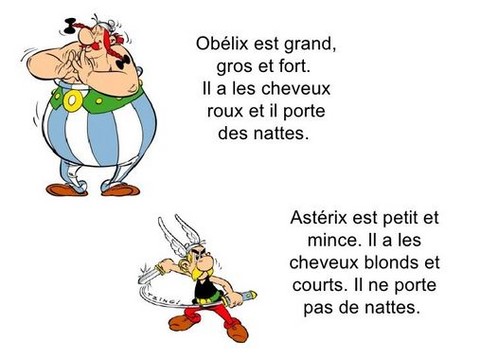French descriptive adjectives
French lesson 9 of grammar: French descriptive adjectives (grand, petit, gros…)

Knowing the French descriptive adjectives (grand, petit, gros, etc.) is really very important. Indeed, in French, descriptive adjectives like grand, grande, gros, grosse, maigre, mince, etc., are widely used. They allow you to describe yourself or to describe someone. At the beginner level (A1 level), this is one of the first things to learn and master. The video below will teach you how to use descriptive adjectives in French:
Thanks to this video and this article, you will learn the French descriptive adjectives. To fully understand and pronounce descriptive adjectives in French, watch the video several times, repeating after the teacher. When the teacher says “grand”, say “grand”. When the teacher says “grande”, say “grande”. When the teacher says “petit”, say “petit”, etc. Thus, you will be able to understand orally and pronounce the French descriptive adjectives well. To do this correctly, watch the video several times, repeating each descriptive adjective out loud after the teacher.
To fully understand French descriptive adjectives in writing and to write them well, copy them several times. Here is the list of descriptive adjectives featured in the video (in chronological order):
Masculine | Feminine | |
|---|---|---|
| grand = tall | grande = tall | |
| petit = small | petite = small | |
| gros = big or large | grosse = big or large | |
| maigre = skinny | maigre = skinny | |
| mince = thin | mince = thin | |
| La taille = size | Il mesure 1m80. = He measures 1m80. | Elle mesure 1m70. = She measures 1m70. |
| Le poids = weigh | Il pèse 72 kilos. = He weighs 72 kilos. | Elle pèse 55 kilos. = She weighs 55 kilos. |
| L'âge de 0 à 55 ans = Age 0 to 55. | jeune = young Il est jeune. = He is young. | jeune = young Elle est jeune. = She is young. |
| L'âge de 55 ans à + = Age 55 to + | vieux = old Il est vieux. = He is old. | vieille = old Elle est vieille. = She is old. |
| Pour les cheveux = For hair | blond = blond Il est blond. = He is blond. brun = brown Il est brun. = He is brown haired. roux = redhead Il est roux. = He is red-hair. | blonde = blond hair Elle est blonde. = She is blonde. brune = brown Elle est brune. = She has brown hair. rousse = redhead Elle est rousse. = She has red hair. |
| Pour les yeux = For eyes | Il a les yeux bleus. = He has blue eyes. Il a les yeux verts. = He has green eyes. Il a les yeux marron. He has brown eyes. Il a les yeux noirs. = He has black eyes. | Elle a les yeux bleus. = She has blue eyes. Elle a les yeux verts. = She has green eyes. Elle a les yeux marron. = She has brown eyes. Elle a les yeux noirs. = She has black eyes. |
Attention, for the hair, we can say: “Il a les cheveux blonds.” and “Elles a les cheveux blonds.”. In this case, the french descriptive adjective "blond" matches the french noun "cheveux" which is masculine plural. This is why we add an "s" to the french descriptive adjective "blond" = "blonds". We will also say: “Il a les cheveux bruns.”, “Elle a les cheveux bruns.”, “Il a les cheveux roux.” and “Elle a les cheveux roux.”.
Be careful, for the color brown (marron), there is no plural "s". That’s why even though “yeux (eyes)” is plural of “oeil (eye)”, we write “Il a les yeux marron.” and “Elle a les yeux marron.”; therefore without “s” to marron.
To deepen this grammar lesson on French descriptive adjectives, you can study the French course: learn to describe yourself physically and the French course: learn to describe a person.
Once you have successfully mastered this grammar lesson on French descriptive adjectives, you can move on to the next French grammar lesson:
You can find other grammar lessons in French by clicking here. You can also perfect your learning of the French language thanks to our:
We regularly publish new content to learn French. To be kept informed of new publications, subscribe to the Youtube channel Flemotion : apprendre le français (video 100% in French but still useful for English speakers to learn French) and to the Youtube channel Learn French with Flemotion (videos with explanations in English) and to the Facebook page Flemotion : apprendre le français.